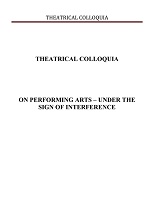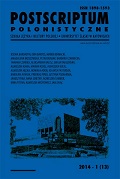
The Ossuary of Memory. Spaces-Time
The Ossuary of Memory. Spaces-Time
Keywords: Kantor; memory; space; postdramatic; childhood
Hans-Thies Lehmann says that one of the characteristics of postdramatic theatre is anchored in the production of environments. We need to emphasize an example Lehmann reveals in his work: the space Pina Bausch proposes as a support to the dancers, that impressive image of a fully flowered field which becomes a real partner of the dancing bodies. Thus, we reach the formula of construction of space in the performance Dead Class, directed by Tadeusz Kantor. We believe the performance approaches that singular and unrepeatable moment which is the elementary school, a biographic instant all of us have known, to which we relate, throughout our lives, a bundle of surprising memories.
More...
